Under the supervision of Dr James Bradley, Mediterranean Institute of Oceanology – MIO, Campus Technologique et Scientifique de Luminy, 163 avenue de Luminy – Bâtiment Méditerranée, 13009 MARSEILLE
RESEARCHER PROFILE: Postdoc / R2: PhD holders
RESEARCH FIELD(S)1: Geosciences, Biology
MAIN SUB RESEARCH FIELD OR DISCIPLINES1: Geosciences, Environmental Sciences, Biological Sciences
JOB /OFFER DESCRIPTION
We are seeking a 24-month Postdoc (PhD-level position) to work on a Human Frontier Science Project (HFSP) funded project ‘The atmosphere: a living, breathing ecosystem?’. The project is a collaboration involving the MIO in Marseille (France), the University of Guelph (Canada), Monash University (Australia) and Arizona State University (USA). The position is under the supervision of Dr. James Bradley (https://www.jbradleylab.com/).
The overall aim of our project is to resolve the composition, capabilities, and activities of atmospheric microbes at a global scale, to distinguish whether the atmosphere exhibits structure and microbial activity characteristic of a true ecosystem, or if it is simply a passive dispersal medium for microorganisms.
The postdoc will develop theoretical modelling approaches (including bioenergetics calculations and power-based ecosystem modelling) to investigate the potential habitability and ecological structure and function of microbial communities in the atmosphere. The initial focus for the postdoc is to model the habitability and ecological processes occurring in Earth’s atmosphere, and then to translate the tools and knowledge generated to the atmosphere of other planetary bodies or exoplanets.
The PDRA will develop, implement and apply microbial bioenergetics ecosystem modelling tools to study the atmosphere, including its resident microorganisms and its overall habitability.
Modelling will focus on:
- Connecting the physicochemical characteristics of the atmosphere with its (potentially) resident microorganisms.
- Determining plausible rates of energy-generating and energy-requiring reactions for atmosphere-dwelling microorganisms and assess catabolic and anabolic activity.
- Combining various (biological, geochemical and geophysical) datasets to assess the survival and potential growth of atmosphere-dwelling microorganisms (using data generated by the project, as well as existing data).
- Assessing habitability of Earth’s atmosphere and habitability indices of the atmospheres of other planetary bodies.
The postdoc will be embedded within a larger international team of microbiologists, geochemists, engineers and astrobiologists who are working collaboratively to understand the atmosphere is as a ‘living, breathing ecosystem’. The postdoc will be a full member of the HFSP research and as well as modelling, is expected to participate in the team’s data analyses and synthesis efforts, participate in cross-discipline collaboration, training and knowledge sharing exercises, and may take part in fieldwork.
The postdoc will be based at the Mediterranean Institute of Oceanography on the Luminy Campus of Aix-Marseille University in Marseille, France, and will be expected to lead the presentation of findings at national and international conferences, and publish in leading academic journals.
TYPE OF CONTRACT: TEMPORARY / JOB STATUS: NEGOTIABLE / HOURS PER WEEK 37.5
APPLICATION DEADLINE:10/05/2024 & TIME 23:59
ENVISAGED STARTING DATE: 01/07/2024
ENVISAGED DURATION: 24 months.
JOB NOT FUNDED THROUGH AN EU RESEARCH FRAMEWORK PROGRAMME
WORK LOCATION(S): Mediterranean Institute of Oceanology – MIO, Campus Technologique et Scientifique de Luminy, 163 avenue de Luminy – Bâtiment Méditerranée, 13009 MARSEILLE
WHAT WE OFFER:
The successful candidate will receive a salary of between €2,616.35 and €2,922.35 per month for candidates with less than 3 years of research experience since PhD completion, or €3,062.56 and €3,368.56 per month for candidates with at least 3 years of research experience since PhD completion. The successful candidate will be entitled to 49 days of holiday per year, with the possibility of remote working. The successful candidate will also enjoy a vibrant research group, access to excellent research facilities and platforms at the Mediterranean Institute of Oceanography and Aix-Marseille University, and be embedded in a team committed to high scientific integrity, open and reproducible science, and promoting inclusivity. Marseille is an affordable, vibrant and historic city on the Mediterranean coast, with culinary excellence, diverse cultural experiences, and a large international community. The candidate will be based in the Mediterranean Institute of Oceanography, on the Luminy campus of Aix-Marseille Université, which is surrounded by nature being nestled among the spectacular Calanques National Park.
Additional information: The Euraxess Center of Aix-Marseille Université informs foreign visiting professors, researchers, postdoc and PhD candidates about the administrative steps to be undertaken prior to arrival at AMU and the various practical formalities to be completed once in France: visas and entry requirements, insurance, help finding accommodation, support in opening a bank account, etc. More information on AMU EURAXESS Portal
QUALIFICATIONS, REQUIRED RESEARCH FIELDS, REQUIRED EDUCATION LEVEL, PROFESSIONAL SKILLS, OTHER RESEARCH REQUIREMENTS
- PhD (by time of appointment) in a relevant natural science discipline, and a track-record of research productivity, including peer-reviewed publications.
- Specialist knowledge and demonstrable experience in numerical, bioenergetic, ecosystem and/or habitability modelling.
- Strong mathematical skills and programming experience.
- Experience with analysis of observational and/or model-derived datasets.
- Strong understanding of microbial processes in the context of microbial ecology, habitability, astrobiology and/or extreme environments.
- Evidence of ability to publish research results in international peer-reviewed journals.
- Knowledge of the physics, chemistry, climate and biology of the atmosphere of Earth and/or other planetary bodies is desirable.
- Ability to organize and prioritize own work, and organize research within the project timetable.
Soft skills:
- Candidates should demonstrate excellent written and verbal communication skills (including English language skills).
- Candidates should demonstrate initiative, analytical and critical thinking, and the ability to work independently.
REQUESTED DOCUMENTS OF APPLICATION, ELIGIBILITY CRITERIA, SELECTION PROCESS
Applications will be reviewed as they are received, and until the final deadline of 10 May 2024. Interviews (in-person or remotely via teleconference/zoom) are expected to be held in May 2024.
Informal enquiries should be made to Dr James Bradley (james.bradley@mio.osupytheas.fr).
Applications should include the following attachments (in English):
- A cover letter (max. 2 pages) stating your motivation for applying to this position, research interests, relevant skills, training and experience.
- Curriculum vitae.
- Copy of official transcript(s).
- Contact information for at least two and up to 3 references.
HOW TO APPLY: james.bradley@mio.osupytheas.fr
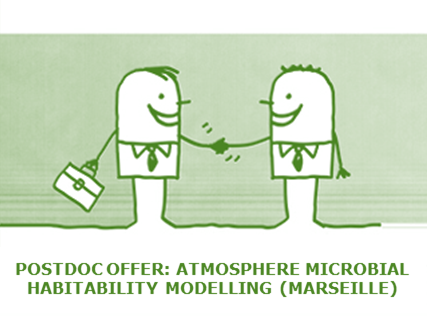
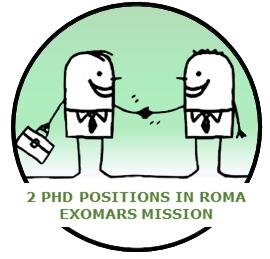
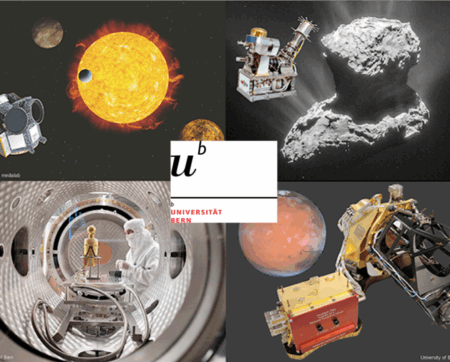
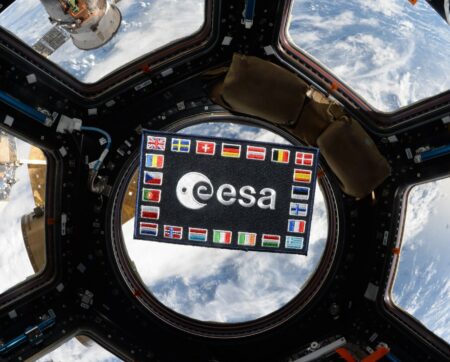
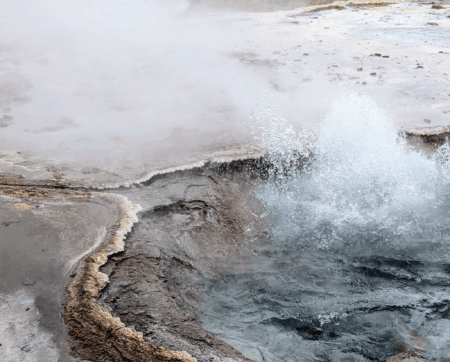
Aucun commentaire sur l'article Postdoc Offer in Atmosphere Microbial Habitability Modelling